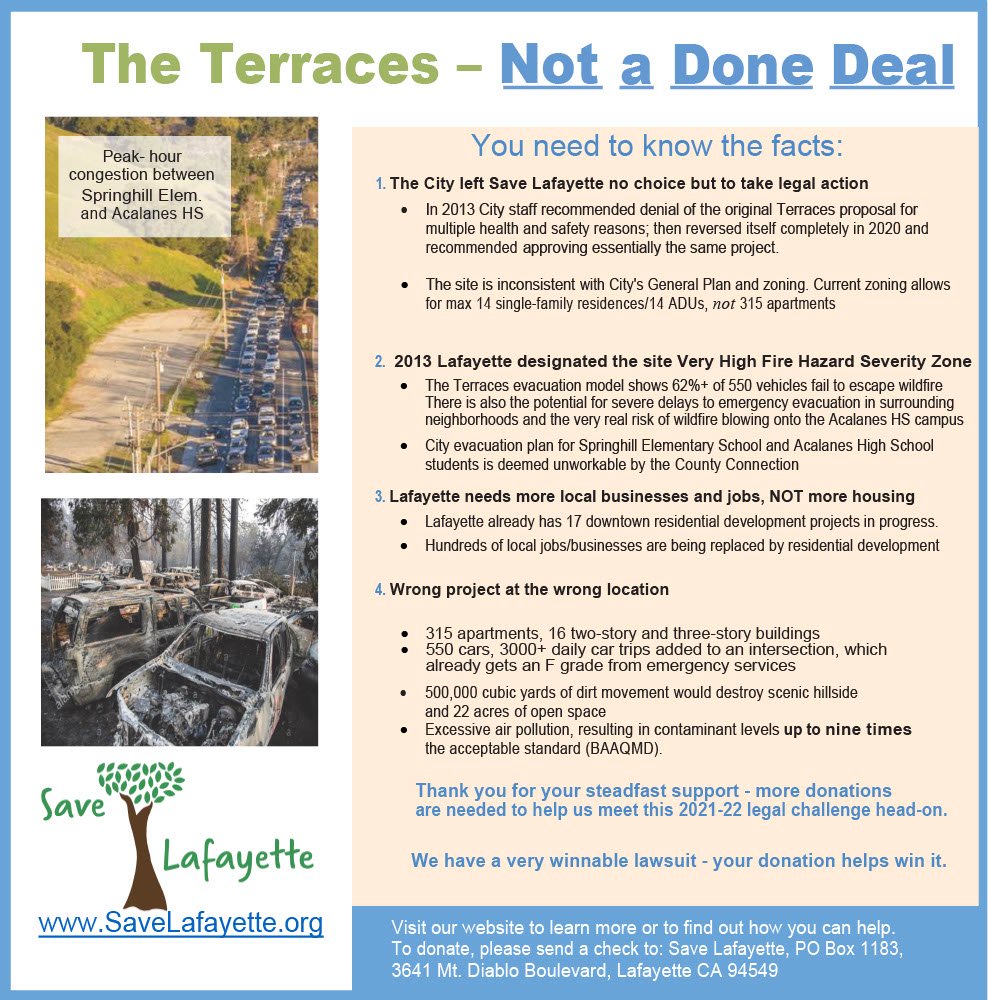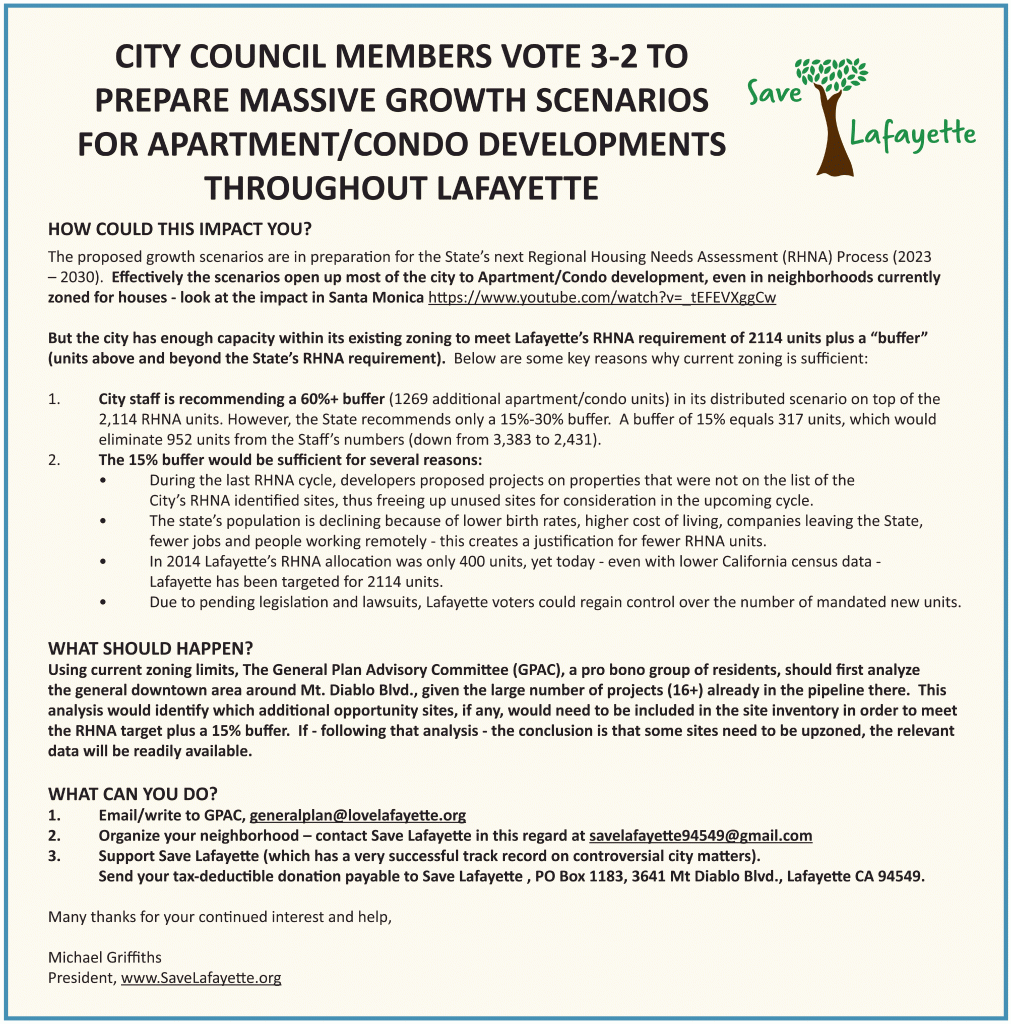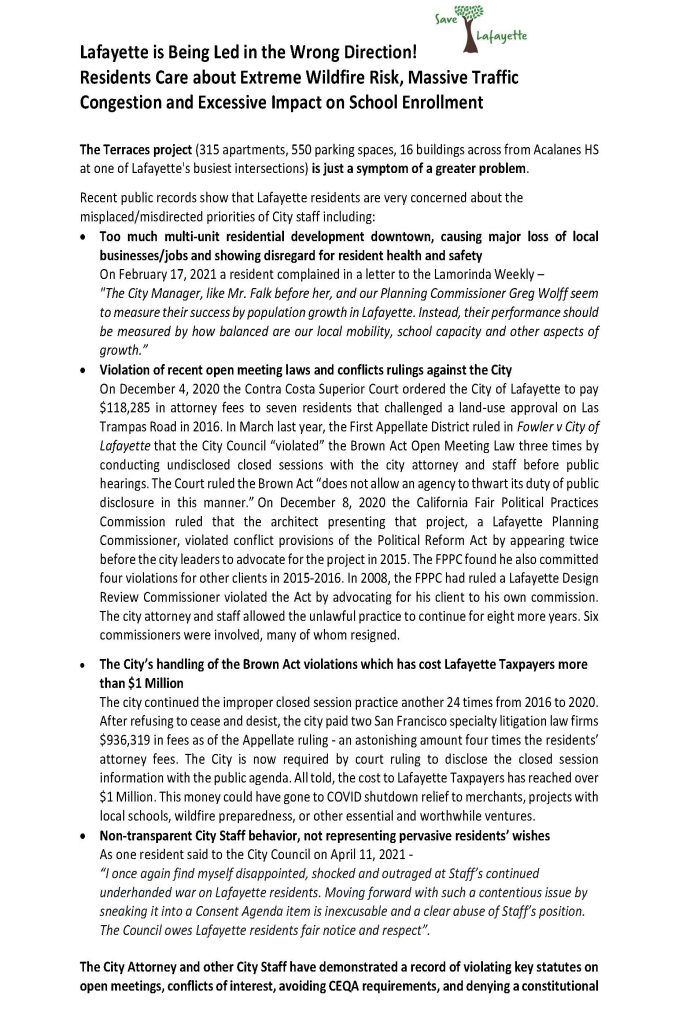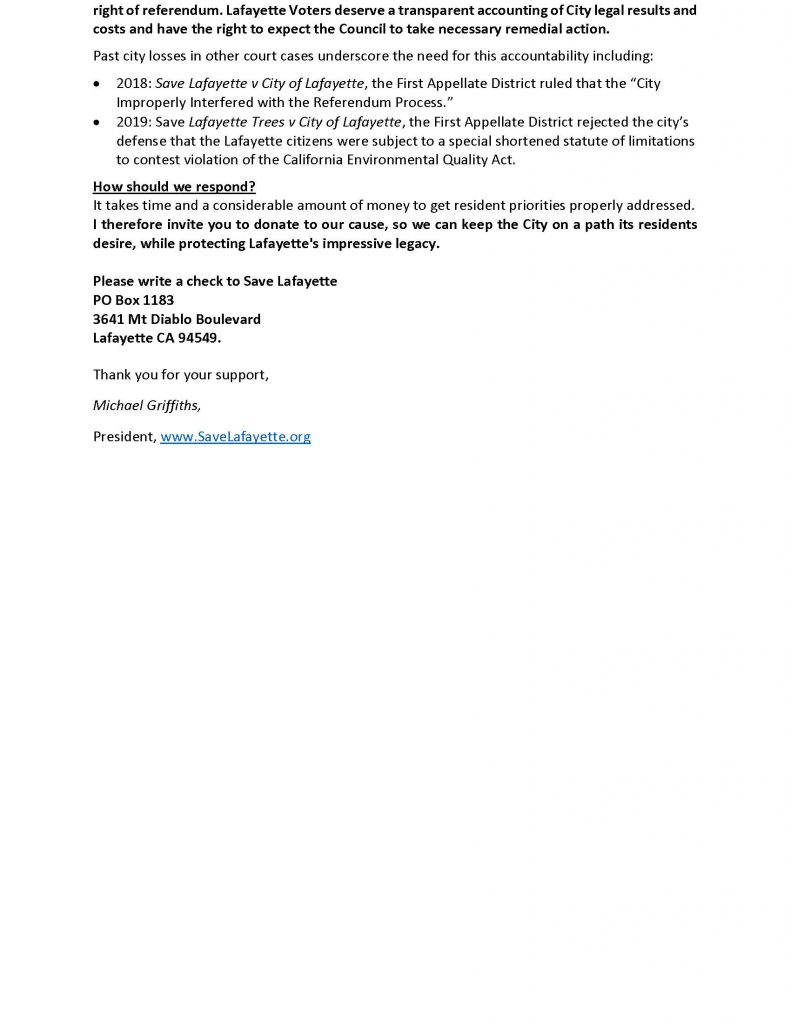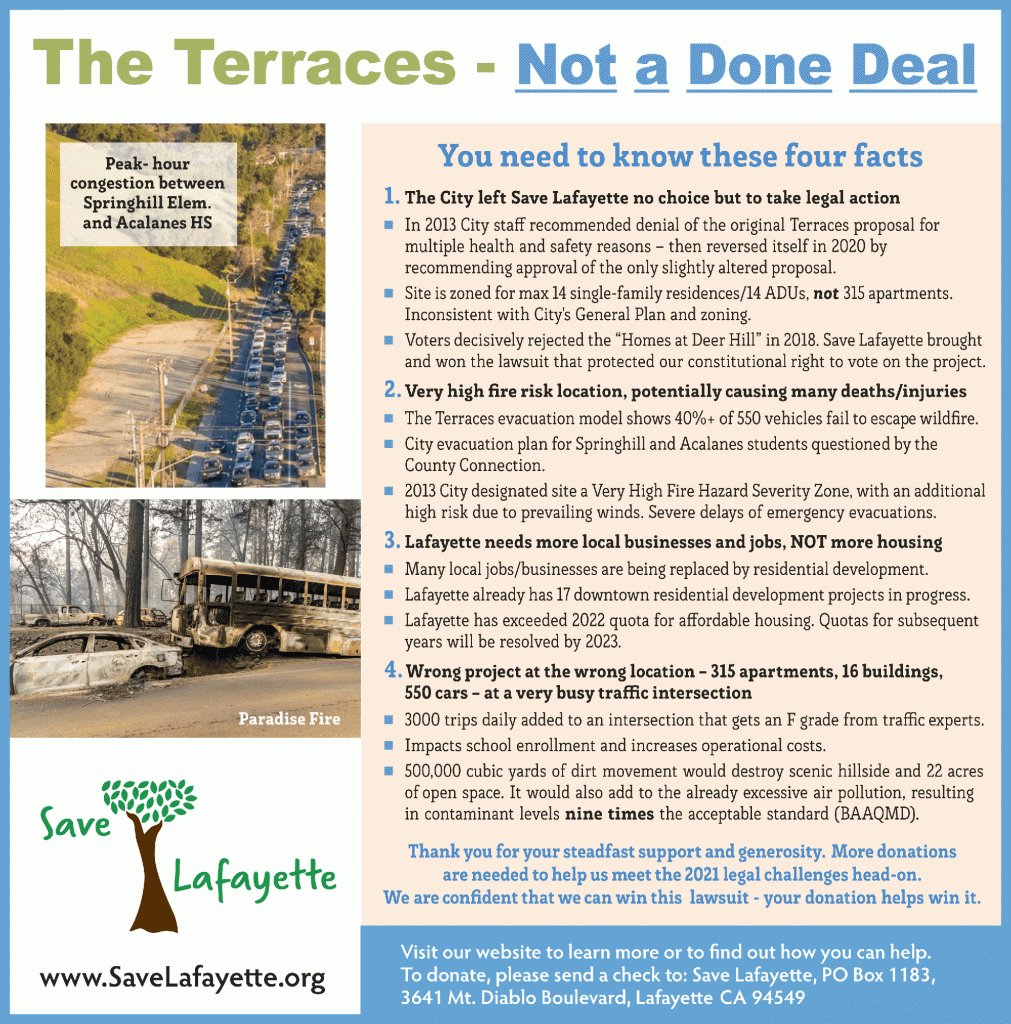If you live in or near Lafayette, the massive 315-unit apartment project at the corner of Pleasant Hill Road and Deer Hill Road affects you. It would worsen traffic, air quality, and school class size; cause months-long noise, impede emergency evacuation and first responder access, and include cancer-causing formaldehyde building materials. Yet on August 24, 2020, the City Council approved it, despite many serious errors and omissions in the original Environmental Impact Report (EIR) and subsequent filings. This approval came after years of controversy and citizen objections to the project in many letters and public meetings. Unable to convince the City of the proven inaccuracies and omissions in the EIR and due to apparent staff mismanagement of the environmental review process, Save Lafayette was forced to take legal action, and on September 23, 2020, filed litigation against the City of Lafayette, the property owner, and the developer.
Save Lafayette’s Legal Challenge
This legal challenge is based on the inadequacy of the EIR and the resubmitted project’s inconsistency with the General Plan and zoning laws. The 2013 EIR identified thirteen unavoidable adverse environmental impacts that could not be mitigated. The resubmitted project fails to adequately address these and others that could be expected.
Save Lafayette and other concerned citizens argued that a Subsequent or Supplemental EIR – requiring extensive public agency review and circulation — should be submitted by the developer, as required by the California Environmental Quality Act (CEQA). But the City accepted a mere Addendum (a less complete addition) to the 2013 EIR, in clear violation of CEQA. Save Lafayette’s goal is to require the City to prepare, circulate, and consider a legally adequate CEQA document, not approving the project until and unless the requirements of CEQA and consistency with the General Plan have been met. This is the law. Citizens of Lafayette and surrounding areas deserve nothing less.
The Resubmitted Terraces Project
The resubmitted Terraces project has significant changes from the original 2011 proposal, including a new southbound lane added on already crowded Pleasant Hill Road and an extension of the northbound turn lane at the intersection of Pleasant Hill Road and Deer Hill, changes that would only encourage more traffic. The plan calls for the removal of many more trees – including protected “Heritage” trees – than originally proposed and two acres of native blue wild rye, threatening habitats of legally protected birds and mammals utilizing the site.
Experts hired by Save Lafayette confirm that these changes would create significant negative environmental impacts. Yet the City unlawfully ignored these expert findings and flagrantly defied Lafayette’s own General Plan (which designates the project site as Low Density Single Family Residential (SF-LD) and zoning laws which would allow up to 14 single family homes. (R-65 adopted 7/23/18 – Ord. 668). Neither the old General Plan and zoning, nor the new General Plan and zoning allow multi-family housing by right on the site, or projects anywhere near the size of the Terraces.
Violation of CEQA
In addition to the significant unavoidable adverse impacts identified in the 2013 EIR, the Addendum failed to adequately address impacts on scenic vistas and resources, visual character, air quality, airborne cancer risks, greenhouse gas emissions, and noise. The project is inconsistent with City of Lafayette land use and planning policies and the Hillside Development permit requirements set forth in the Municipal Code.
Traffic Congestion
The City’s traffic consultant TJKM had previously been hired and paid by the developer to work on a traffic report in December, 2018, that on April 29, 2019, was rejected by the City as “inadequate and requires substantial revisions and additional technical analysis. … Some of the conclusions made were not accompanied by sufficient evidence or justification.” The Council instructed staff to have a new traffic study prepared. Incredibly, staff hired TJKM to do this new study despite their obvious conflict of interest. So earlier this year, TJKM provided another woefully deficient study of the expected impacts on traffic in the area surrounding the project site. Save Lafayette, in response, hired traffic consultant Elite Transportation Group, whose report revealed numerous egregious omissions in the TJKM report.
Furthermore, the August 10 City staff report represents the project is “adding a trap lane [forced turn] for the SR-24 westbound on ramp,” but this has not been approved under the Gateway Constraints policy, which other agencies control and may not be forthcoming.
Fire Safety and Evacuation
The worst part? The property is located entirely in a Very High Fire Hazard Severity Zone as designated by the State AND the City. Astonishingly, TJKM also declared that the project (which would house at least 550 cars) would have essentially NO impact on the evacuation of existing Lafayette residents trying to escape via Pleasant Hill Road in the event of a significant wildfire. Do you believe that? Four members of City Council apparently did.
Save Lafayette’s traffic consultants reviewed the evacuation study done by TJKM and found that within the Terraces project, including the new questionable Trap lane, of the 551 cars assumed, only 208 are able to get out in the first hour of the evacuation. 343 would be stuck. If there is no Trap lane, only 16 cars would make it out in the first hour. 535 cars would be stuck in their driveways.
If no trap lane is built, an additional 553 neighborhood cars would be stuck in their driveways after the first hour, unable to even get to Pleasant Hill Road. Adding the trap lane drops this to 152 extra cars stuck in the first hour, but that is still 152 cars too many. If you live on Springhill Road, Reliez Valley, Quandt Road, Stanley Boulevard, or one of their side roads, this project could prevent you from escaping the oncoming fire.
Both the Lafayette and Acalanes school districts have stated that traffic causes great concern for the safety of our students. The emergency plan to evacuate them from Acalanes High School, Springhill Elementary, and Montessori School relies on parents driving to the schools to pick up their children, adding to traffic and threatening gridlock. The Terraces plan is illusory. The June 22 TJKM evacuation scenario asserts that 266 Springhill and 1,124 Acalanes students “would be evacuated” by 5 County Connection buses for Springhill and 22 for Acalanes. This would supposedly eliminate 1,400 inbound and 1,400 outbound vehicle trips during emergency evacuation.
Actually, there are no such buses. The General Manager/CEO of County Connection wrote to the City Council that his agency had no contact with TJKM at all. He added that it could not in any case commit such resources in advance in the event of a wildfire evacuation. City staff and City council did not see this falsehood as reason to distrust TJKM’s traffic report, on that or any other issue.
Last October a relatively small wildfire swept across Highway 24 and burned down the Lafayette Tennis Club. Mandated evacuations resulted in total gridlock on side streets and in both directions of Pleasant Hill Road — and that was on a quiet Sunday afternoon. Add over 550 vehicles from the Terraces, a larger wildfire, or one during commute or school hours, and you have a calamity waiting to happen.
What Happens Next?
The City of Lafayette’s inattention to detail and willingness to overlook critical issues has forced Save Lafayette to take legal action in order to protect Lafayette’s current and future citizens. Save Lafayette’s legal counsel, Lozeau Drury, is well versed in CEQA law and experienced in CEQA litigation. We are in good hands. But legal representation is expensive, and Save Lafayette must fundraise in order to continue this challenge of the City’s abuse of discretion and failure to proceed in a manner required by law. You can view the entire Verified Petition for Writ of Mandate on Save Lafayette’s website (www.savelafayette.org).
Remember, we won our last lawsuit against the City and the developer!
You can help. Please donate to Save Lafayette to defray legal costs for our campaign to keep this dangerous project out of Lafayette’s most gridlocked intersection.
Let us return to thoughtful inclusion of projects that work for our city and for the new members of all ethnicities whom we welcome into this community.
Read more and make a tax-deductible donation at www.savelafayette.org
Or send your check (payable to “Save Lafayette”) to
Save Lafayette, PO Box 1183, 3641 Mt. Diablo Blvd., Lafayette, CA 94549
